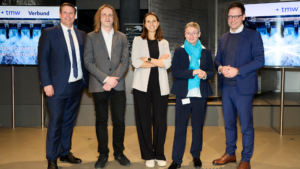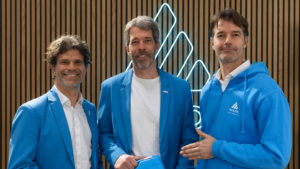Synthesia IPO: “Never Europe. The London Stock Exchange is a complete disaster”

How can Europe still score points in the AI storm between the USA and China without going under? This question is being asked not only in Vienna, Berlin or Brussels, but also these days in Copenhagen. There, Scandinavia’s largest tech and startup conference TechBBQ is currently being held, which Trending Topics and newsrooms are also attending and mingling among the approximately 10,000 participants.
Much attention was given to the panel discussion with Synthesia founder and CEO Victor Riparbelli (Generative AI), Creandum partner Johan Brenner (major Scandinavian investor), EU-Inc initiator Iwona Biernat and Project Europe founder Kitty Mayo, which revealed both the structural problems and the potential of the European tech location.
What Synthesia founder Riparbelli has to say carries weight in Denmark and beyond. He is Danish and therefore a local hero at TechBBQ, and Synthesia is currently the most valuable AI startup in Europe.
IPO Desert Europe
Europe’s capital market problems became particularly clear. When asked where he would take Synthesia public (the startup headquartered in London was valued at $2.1 billion in 2024), Riparbelli answered without hesitation: “Never Europe. The London Stock Exchange is a complete disaster.” This aligns with the assessment at Bitpanda from Vienna. The crypto unicorn recently announced striking the LSE from its list of possible stock exchanges, with Frankfurt and New York now remaining in the running.
Johan Brenner, General Partner at Creandum (including Lovable, Trade Republic, Klarna, Bolt) sees a fundamental problem here: “What’s missing in Europe is later-stage funding. We have a lot of early-stage capital, but it looks bleak for later financing rounds and especially for public markets.”
The causes lie deep in European savings culture. While seven out of ten people in Sweden invest in stocks, it’s only one out of ten in continental Europe. “The pension systems in Europe are based on interest, not on equity. Europe doesn’t participate in its own successes,” Brenner criticizes.
The result: 80% of later-stage financing in Great Britain comes from foreign investors – a complete contrast to the Bay Area, where 80% of capital comes from the USA.
Application Layer vs. Foundation Models: Europe’s AI Dilemma
In AI development, the experts see Europe in an ambivalent position. “We’re very good at building applications on existing models,” explains Brenner. “But most foundation models and their development happen in the USA.”
Kitty Mayo from Project Europe confirms this trend among young founders: “We see many founders who want to build on the application level, but not so many who want to develop foundation models.”
Instead, she observes a turn toward hardware innovations: “Many young founders are turning to hardware because it feels like an area where they really have the potential to be at the forefront and change the world.”
Brenner sees the solution in fundamental investments: “Can we compete in the fundamental parts of the ecosystem? That means: cheap energy costs, the best minds, chip technology, algorithms. Then we can build real competitive advantages from Europe.”
Europe’s Strengths and Weaknesses Compared to the US Europe’s Advantages Victor Riparbelli highlights Europe’s “brand” as a major advantage: “We actually have a great brand with Europe. Many people love Europe as a place for vacation and living. In London, we found it easier to get people from the Bay Area to London than to New York because the idea of living in London or Denmark is attractive to many people.”
Europe’s advantages are clear: free healthcare, free education, high quality of life. “If we did a marketing campaign about how beautiful it is to live in Europe – that would improve our situation enormously,” says Riparbelli.
The Structural Disadvantages
But these advantages are negated by regulatory hurdles. Riparbelli describes a concrete example: “We have an office in Denmark. Two employees from Slovenia who worked with us for five years wanted to leave the country but can’t – because they would have to pay taxes on unrealized gains from startup shares.”
Riparbelli sees regulatory over-regulation as the core problem, which manifested in the much-criticized AI Act: “We need to move away from this idea that academics can sit in a room and predict what will happen in the tech world. Neither founders, nor scientists or investors can predict what will happen in AI in the next three months – and academics in Brussels definitely not.”
Underdogs Are Loved, Big Companies Are Not A particularly interesting point: the European mentality. “We have a cultural problem in Europe,” explains Riparbelli. “We love the underdog, but as soon as a company starts becoming successful, we don’t like it anymore. Then they probably cheated someone or are evil.”
This is reflected in startup politics: “Many governments here think about the quantity of startups. How can we fund all the unfundable ideas? That shouldn’t be the focus. Great teams can raise money. We need one, two or three really big tech companies in Europe.”
Glimmer of Hope: The EU Inc
The panel sees a bright spot in the planned EU Inc (28th regime). Iwona Biernat, who leads the movement, reports weekly meetings with Brussels: “It’s actually happening. We’re not calling for it anymore – it’s work in progress.”
The initiative, which already has 16,000 supporters, aims to create a unified standard for Europe instead of 27 different legal systems. “It’s estimated that this could unlock a trillion euros of capital flow in Europe,” says Biernat.
Conclusion: Europe at a Turning Point
The discussion shows Europe at a critical turning point. The ingredients for success are present – talented founders, attractive living conditions, growing venture capital scene – but structural problems with regulation, taxation and capital markets are hampering the potential.
“We’re in a tech war,” summarizes Brenner. “How do you win that? Through innovation. And how do you innovate? By having the best talent. We’re competing for people to see Europe as the best place to live and work.”






























